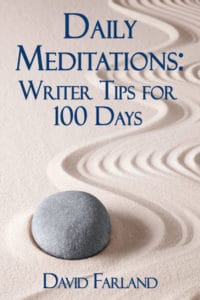Yesterday I got an email from a reader who wanted to know how to get an editor’s attention. He said that he had heard that you don’t need an agent in order to get an editor to read your manuscript, and to some degree he is right. Some editors will say in their guidelines that they don’t take “unsolicited manuscripts.” An unsolicited manuscript is one that is just sent through the mail. However, in these cases if you send the editor a query letter telling them a bit about your novel, the editor might well be willing to look at your manuscript. At that point, the manuscript has now been “solicited.”
However, you have to take care. Some editors say that they won’t take “un-agented manuscripts.” This means that they really do require an agent.
So here are a few sure-fire ways to get an editor’s attention:
1. Get published by other editors.
If you sell short stories to four or five different markets, you become recognized as a “proven” author, someone whose skills assure that you can sell. You also develop your own audience. So if you can show success in that way, you may well find that editors begin looking for you.
2. Win awards.
Once again, winning contests—even contests open only to unpublished authors—will get you noticed.
3. Have an impressive bio.
If you’re writing nonfiction in particular, your bio can have a huge influence on whether editors will talk to you. Yet the same can help with fiction. If you’re a DJ and have your own morning talk show, you’ve got a ready audience for your fiction. If you have interesting life experiences that you can draw upon to give your story verisimilitude, that also can help sell your work.
4. Come with a ready audience.
John Scalzi and some other authors have had a large presence on the network due to blogs. In fact, John and a few others were “discovered” when they self-published on their blogs. Recently, a publisher raised a few eyebrows when they rejected an author’s manuscript because “we googled your name, and you weren’t popular enough.” Having a million close friends on Facebook is now a big plus.
5. Get attention by successfully self-publishing a book or story.
This has worked several times for authors in the past year. It doesn’t matter whether you publish electronically or in print—if you can garner enough positive reviews or strong enough sales, you can attract a publisher.
6. Meet the editor that you want to talk to.
This can be done at conventions, writer’s conferences, and so on. Please be aware, though, that it is considered an imposition if you go to the publisher’s place of work and try to force a manuscript upon him or her. If you try it, you’ll likely get rejected immediately. In fact, they just might call security and get you both ejected and rejected.
7. Write a tremendous query letter.
In order to do that, you need to write a novel that either impresses the editor as being very sellable or of high quality. It also needs to come at a time when the editor has a slot open to publish a book by a new author, and unfortunately in many cases your timing might just not work.
8. Get celebrity endorsements for your work.
Cover quotes from other authors, movie stars, and so on can help convinced the editor that you’ve got a valuable property.
9. Kidnap the editor,
take him or her to a secluded mountain cabin, and threaten to break his legs with a mallet if he doesn’t read your manuscript. (Okay, I just added this so that I could get ten ideas. Don’t do this.)
10. The number one way to get an editor’s attention is to write a great novel.
Seriously, most editors will tell you that “The only thing that matters is a great manuscript.” So if you spend a good deal of time making sure to plant plenty of hooks in the opening of your manuscript—fascinating and likeable characters with intriguing problems, along with powerful writing—many editors will respond.
Now, unfortunately there isn’t any magic trick that will get every editor to look at your work every time. If anyone has his or her own ideas, I’d be happy to hear them. Tomorrow I’ll give you some tips on how to avoid instant rejection.
David Farland





